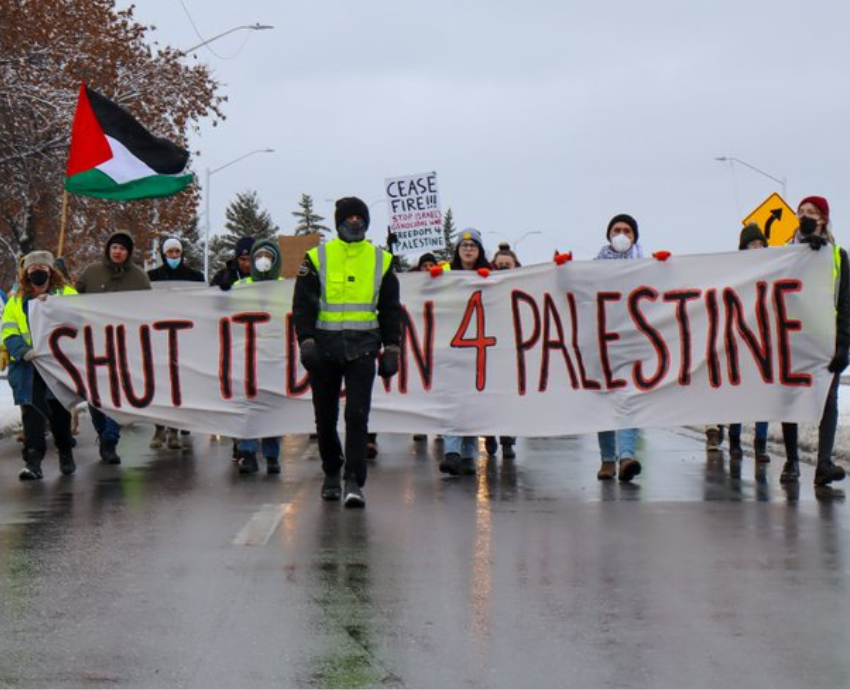
As the Israeli bombardment of Gaza has extended more than a month, Palestine solidarity movements in Canada have shifted in tone and focus.
While mass rallies are still held, to build community and keep attention on the Israeli atrocities, there has been a rise in pointed direct actions targeting weapons manufacturers and politicians of the ruling federal government. These actions have ranged from blockades and pickets of arms companies and political events to sit-ins and “die-ins” at company and politicians’ offices. This comes as the federal Liberal government has refused even to call for a ceasefire, as the death toll in Gaza — which the United Nations calls “a graveyard for children" — rises to more than 11,000.
Notably, these direct actions have been organised on autonomous and decentralised bases with affinity groups acting against different targets simultaneously. This has allowed multiple actions to occur more regularly, at unexpected times and places. Actions have occurred almost daily over the past two weeks, with actions across the country called on national days of action.
November 9
November 9 was an international day of action, under the slogan “Shut It Down for Palestine”, called by Palestinian solidarity organisations. Actions in Canada started in Dartmouth, Nova Scotia, where people blockaded three entrances to GeoSpectrum, a subsidiary of Elbit and a weapons supplier to Israel. Elbit is a major Israeli weapons manufacturer and Elbit Systems have been targeted for international calls to #ShutElbitDown.
In Montreal, people held a sit-in at Prime Minister Justin Trudeau’s electorate office. Posters were put up inside saying “Free Palestine” and “Ceasefire Now.” Seven people were arrested as police dragged participants from the office.
Elsewhere in Montreal, students from Concordia University, McGill University, and Université de Montréal held student strikes, leaving classes and rallying to denounce their schools’ complicity in genocide through financial ties to companies doing business with Israel. They marched to the Scotiabank office near McGill’s campus and picketed for several hours.
Scotiabank is a key target of the Canadian Boycott, Divest and Sanctions (BDS) movement, because it is a major shareholder in Elbit Systems. Other actions were held at several Scotiabank offices across the country throughout the day.
University administrators have moved to increase security and surveillance of students on campus.
Hundreds occupied Union Station, the main transit and rail hub in Toronto. The protest was organised by the Jews Say No to Genocide coalition. Protesters occupied the thoroughfare where commuters exit the subway and enter the concourse business area.
In Vancouver, activists took over the offices of ZIM Lines, Israel’s largest and oldest cargo shipping company. ZIM transports military weaponry and equipment to and from Israel. While several people entered the offices to challenge ZIM staff, others held a die-in in the lobby. Following the action, activists joined others for a picket and postering at Scotiabank offices downtown.
Later that evening I was part of an action organized by Independent Jewish Voices, which shut down a CA$500-a-plate fundraiser for Foreign Affairs Minister Melanie Joly, at an exclusive restaurant in Vancouver. Initially a group of about 60 of us blockaded the hotel to stop the event. Later, a 1000-strong protest marched from the Vancouver Art Gallery to join us. The Minister was forced to cancel the event.
November 10
There were blockades at three L3 Harris facilities on November 10. L3 Harris is a major supplier for Lockheed Martin's F-35 aircraft, used in Israel’s ongoing bombardment of Palestinians in Gaza.
More than 200 workers managed to block all entrances to the L3 Harris facility in Toronto. L3 facilities were also shut down in Hamilton and Montreal.
Protesters also blockaded Lockheed Martin’s weapons manufacturing plant in Ottawa.
Activists shut down two gates at the Winnipeg Boeing factory, demanding that the company divest from manufacturing weapons used by Israel. They also handed out leaflets to workers attempting to enter the plant through the gates.
Later in the day, students at the University of British Columbia shut down another event involving minister Joly. Students walked out of classes to join the picket and some managed to get inside to challenge the minister directly over the ruling Liberal government’s refusal to call for a ceasefire.
Notably, many of the actions have been initiated and organised by Jewish activists — from Jews say No to Genocide to Independent Jewish Voices. They are calling for a ceasefire and putting out the call, “Not in Our Name”. The Palestine solidarity movements have steadfastly spoken out against antisemitism and stood against any manifestation of it at rallies and actions.
New direction
The move to autonomous, targeted, direct actions is significant. These are strategies and tactics of economic and political disruption, acting to impede or stop “business as usual” and to impose real costs on those facilitating, arming, and/or profiting from atrocities and genocide.
The emphasis is not on moral appeals, or calls to conscience, alone — recognising that arms manufacturers and many politicians have none.
While their actions may be shameful, the ones calling the shots have no shame. Instead, the emphasis is on shutting down the machinery of war — economic and political. And such targeted actions are happening globally.
War profiteers must have their bottom line negatively impacted, arms producers must be stopped from producing. Politicians must be confronted directly by the consequences of their actions — by being face to face with Palestinians who have lost loved ones. They cannot raise campaign money while supporting genocide.
The shift to autonomous, decentralised actions, not made public in advance and not revealed to police, gives flexibility and facility to ensure disruptions and shutdowns can successfully impose costs on targets. A key challenge remains getting workers in specific industries directly involved. This has happened with work stoppages at ports over the arrival or loading of ships supplying the Israeli armed forces.